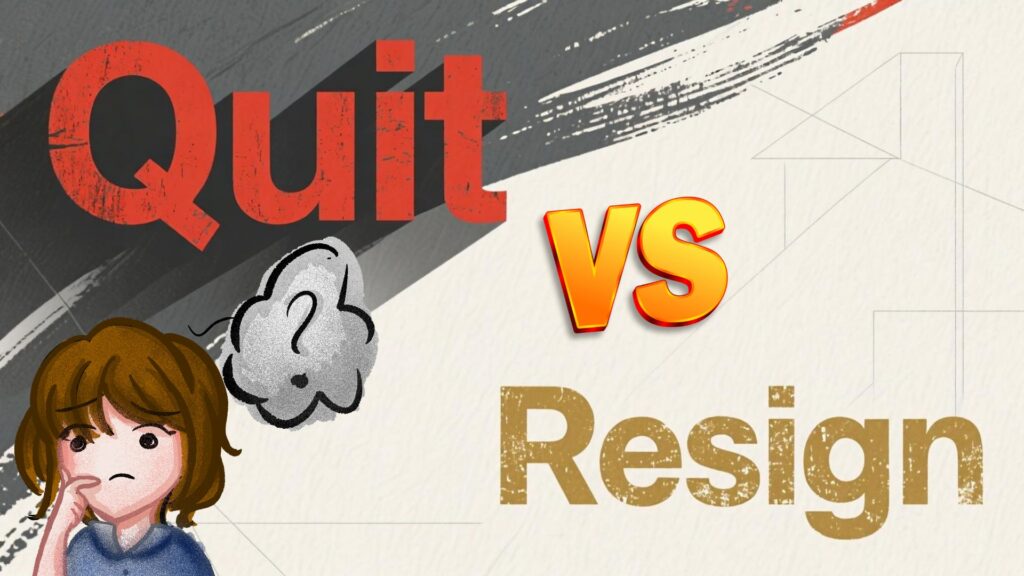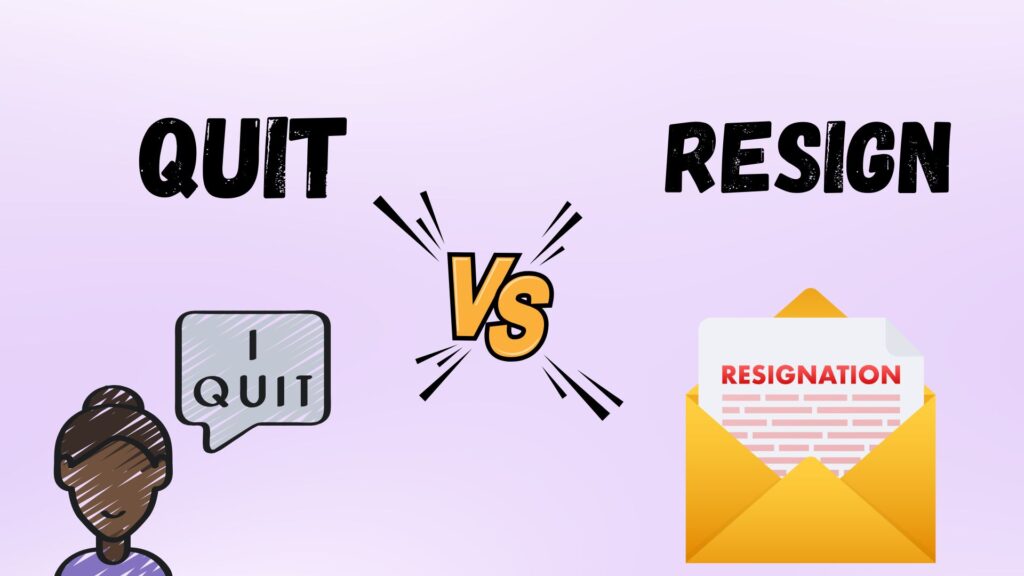Ever been stuck wondering whether you should say “I quit” or “I resign” when leaving your job? Both words mean you’re walking away from something, but they’re not interchangeable in every situation. The difference isn’t just about meaning it’s about tone, formality, and even your professional image.
This article breaks down the difference between quit and resign, explores their meanings, grammar rules, synonyms, and real-world usage. We’ll also look at common mistakes, example emails, and even the etymology of quit and resign to make sure you never misuse them again.
Quit vs Resign: Simple Definition + Usage Overview

Before diving deep, let’s clear up the basic meanings.
- Quit: To stop doing something, such as a job, activity, or habit. It’s informal and often emotional.
- Example: “I quit smoking last year.”
- Resign: To voluntarily leave a job or position, usually in a formal or professional setting.
- Example: “She resigned from her position as CFO.”
Think of it this way: “quit” feels casual and abrupt, while “resign” sounds planned and professional.
Clear Rules & Patterns
How do you know which word to use? Here’s the breakdown:
1. Formality
- Quit → Informal, casual speech, everyday talk.
- Resign → Formal, professional language, written notices.
2. Tone
- Quit = Emotional, sometimes abrupt.
- Resign = Neutral, polite, professional.
3. Context
- Quit → Jobs, habits, sports, commitments.
- Resign → Leadership roles, office positions, boards, committees.
Bulleted Rules with Do’s and Don’ts
✅ Do use “resign” when:
- Writing a resignation letter.
- Leaving an official or corporate position.
- Communicating with HR or management.
❌ Don’t use “quit” in:
- An email to your boss.
- A formal notice period discussion.
✅ Do use “quit” when:
- Talking casually to friends: “I quit that job.”
- Referring to habits: “He quit smoking.”
❌ Don’t use “resign” in:
- Informal chats with friends. It sounds odd: “I resigned from Starbucks.”
Multiple Example Sentences
Quit
- “I quit my job last week.”
- “He quit the soccer team mid-season.”
- “I quit smoking two years ago.”
Resign
- “I plan to resign from my position by the end of the month.”
- “She resigned due to health reasons.”
- “The CEO resigned after the company merger.”
Common Mistakes & Fixes
- Mistake: Writing “Please accept my quit letter.”
✅ Fix: Always write “Please accept my resignation.” - Mistake: Saying “I resign!” during an argument with your boss.
✅ Fix: Calm down and send a professional resignation email instead. - Mistake: Using resign when talking about habits:
“I resigned smoking last year.”
✅ Fix: Use quit: “I quit smoking last year.”
Scenario Examples: Emails & Conversations
1. Formal Resignation Email Example
Subject: Resignation Notice – Effective October 15
Dear Mr. Thompson,
I am writing to formally resign from my position as Senior Analyst at Greenfield Corp, effective October 15, 2025.
I truly appreciate the opportunities for growth and the support provided during my tenure. Please let me know how I can assist with the transition process.
Thank you once again for your guidance and leadership.
Sincerely,
Sophia Carter
2. Informal “Quit” Conversation
Friend: “You look relaxed! What happened?”
You: “I quit that job yesterday. Honestly, I feel so much better now.”
Friend: “Wow, that’s a big move. What’s next for you?”
3. What Not to Send
Subject: I Quit
Hey Boss,
I quit. Don’t expect me tomorrow.
Jake
This is unprofessional and burns bridges. Use resign for emails.
Etymology of Quit and Resign
- Quit comes from the Latin quietus, meaning free or released, which evolved into Middle English “quiten”.
- Resign comes from Latin resignare, meaning to unseal or give up, commonly tied to formal surrendering of authority.
Quit (as a Verb and Adjective)

- Verb: “I quit my job.”
- Adjective (less common): “He was quit of his debt.” (old-fashioned, meaning free from obligation).
Resign (as a Verb and Adjective)

- Verb: “She resigned from the board.”
- Adjective: “He looked resigned to his fate.” (meaning accepting something reluctantly).
Quick Reference Table
| Aspect | Quit | Resign |
|---|---|---|
| Formality | Informal | Formal |
| Common Use | Casual talk, habits | Professional notices |
| Emotional Tone | Emotional, blunt | Neutral, polite |
| Typical Context | Jobs, smoking, sports | Job roles, boards |
| Correct Email Use | ❌ | ✅ |
Synonyms
Quit Synonyms
- Leave
- Exit
- Give up
- Drop out
- Walk away
Resign Synonyms
- Step down
- Retire
- Relinquish
- Abdicate
- Vacate
LSI Keyword Integration Examples
- “difference between quit and resign” → Quit is informal and casual, while resign is formal and professional.
- “quit job email example” → Avoid writing “I quit” in an email; use resignation letter format instead.
- “resign from position meaning” → It means formally giving up a professional role.
Final Thoughts
So, should you quit or resign? Both mean leaving, but context matters. Quit works for casual talk and habits: “I quit smoking.” Resign is your go-to for formal exits: “I am resigning from my role effective October 10.”
When in doubt, ask yourself: “Am I speaking casually or writing formally?” That one question will help you pick the right word every time.
Bugti is the founder of Quoethint.com, a hub for English language tips, writing advice, and grammar guidance. With years of experience in English studies and a passion for clear communication, Bugti created this platform to make grammar and writing easy to understand for everyone.
